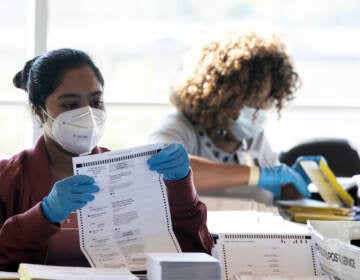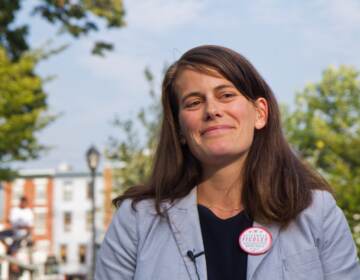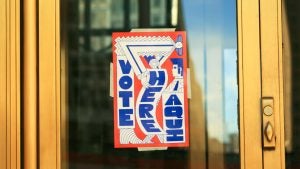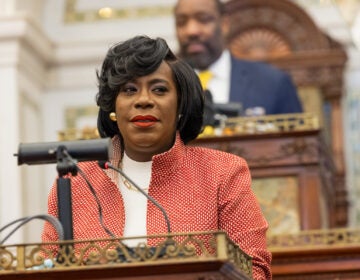More cash to pay for elections? The mayor’s office doesn’t trust the math
The explosive increase in mail balloting and new voting machines have the officials running Philly elections and the mayor’s office at odds over funding.
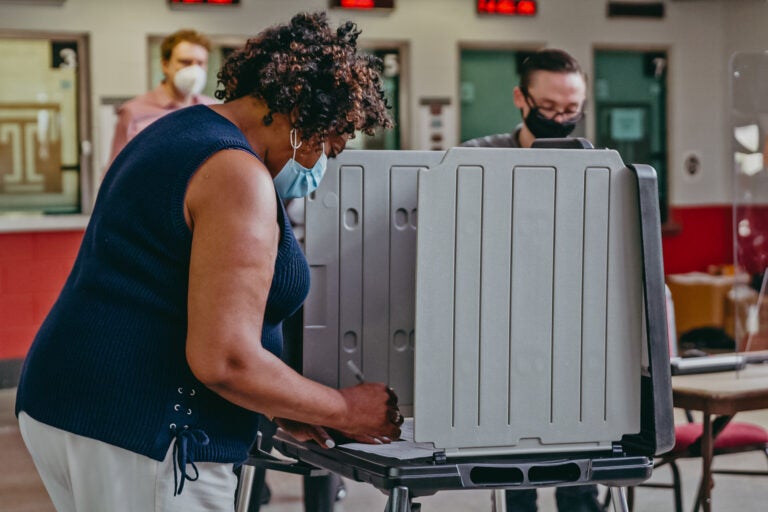
The first voter at the Liacouras Center satellite election office, Priscilla Bennet, fills out her official mail-in ballot, and demonstrates for the press the process. (Kimberly Paynter/WHYY)
With a primary election less than a month away, and general midterm elections looming, Philadelphia city commissioners and Mayor Jim Kenney’s administration are locked in conflict over the money needed to fund those elections.
Commissioners say they need more money allocated all at once in the new fiscal year. City officials say they’re committed to fully funding elections — but they don’t totally trust the commissioners’ estimates.
At budget hearings last week, Commissioner Lisa Deeley said the costs to run elections in the city had risen sharply thanks to new voting machines and a sweeping 2019 expansion of mail voting that makes it more time-consuming to process and tabulate ballots.
Over the past few years, she said, the commissioners have been allocated a budget that doesn’t cover all their new expenses, and they’ve routinely had to go back to the mayor’s office and ask for more. After being allocated $22.4 million in the current fiscal year, for instance, they’re on track to exceed that amount by about 24%.
That’s why, commissioners say, they need nearly $4 million more than the $22.8 million Kenney’s office proposed in his initial budget pitch. Commissioners’ spokesperson Nick Custodio said it’s hard to properly plan without knowing how much money there will be.
“If it’s not in our original appropriation, it could cause delays in planning down the line,” he said. “We would like to be able to implement and plan and do all that and not have to fight for funding.”
Days after the commissioners first made their public plea for a bigger budget, the mayor’s office is saying it’ll take a more careful assessment of commissioners’ finances before they’re ready to commit to anything.
“The City Commissioners’ late and confusing budget submission made it impossible for it to be considered as part of the normal deliberations,” Kenney communications director Kevin Lessard said in an email. “We look forward to working with City Council through the FY23 budget process to determine the appropriate level of funding for all departments.”
He noted that the city came to its budget proposal for the commissioners’ office by subtracting the one-time cost of new electronic poll books that commissioners budgeted for this fiscal year, and adding an additional $2 million for “evolving election operations to support new staff and equipment.”
But he said if commissioners still need more funding, the city can likely cover it by moving funds from other departments.
Custodio said he didn’t want to get into a “he said, she said” argument with the mayor’s office over the budget request process. He admitted that the commissioners’ request had indeed been six weeks late, but maintained that the delay was because the office is already short-staffed and underfunded.
“We need money to run elections and we also need money to run a department,” he said. “We’re constantly trying to juggle eruptions.”
Before the mayor signs off on it, City Council has to approve the proposed budget.
Council members have been generally supportive of the commissioners and their financial difficulties.
For months, at-large Councilmember Isaiah Thomas has been advocating for satellite election offices, more ballot drop boxes to make it easier for Philadelphians to vote, and additional languages on ballots. Following Deeley’s testimony, he sent a letter to the mayor’s office urging Kenney to “continue to reform and modernize Philadelphia elections” by allocating $27 million to the commissioners for the full fiscal year.
He also called for Gov. Tom Wolf to provide additional funding to get next year’s budget up to $36 million total — a number he believes will cover a slew of one-time upgrades and fully modernize the system.
“We can pay for some of the one-time funding things that we need right now…and that puts us in a position where we’re only funding elections based on operating costs [going forward],” he said. “It puts us in a position where we can ensure that we’re not putting democracy at risk.”
Custodio echoed that argument.
In the last few elections, he said, an enormous amount of attention has been on Philadelphia’s ballot-counting process. Thanks to the exponential increase in mail ballots Pennsylvania has seen since it expanded them in 2019, and a state law that bans counties from beginning to process those mail ballots until Election Day, the city is always working on an extremely tight timeline to publicize results.
Some delays are just unavoidable, Custodio said. But the commissioners think modernization can help as the state readies for major elections for governor and U.S. Senate this year.
“How quickly Philadelphia can count those votes and deliver clarity to those elections will let the world know…who’s controlling the United States Senate,” he said. “We learned from 2020, if we cannot count those ballots quick enough, then all of a sudden conspiracy theories start taking over.”
The city’s goal, he said, should be to deliver results in these races “in the quickest, most accurate way possible.”
WHYY is your source for fact-based, in-depth journalism and information. As a nonprofit organization, we rely on financial support from readers like you. Please give today.



